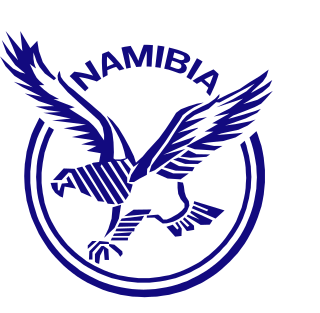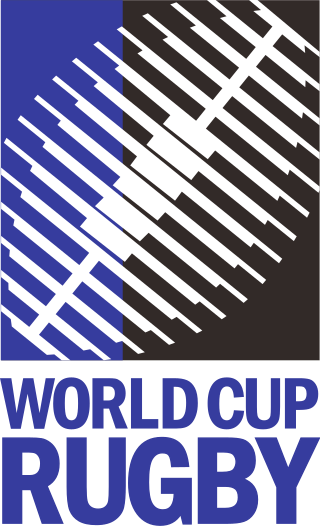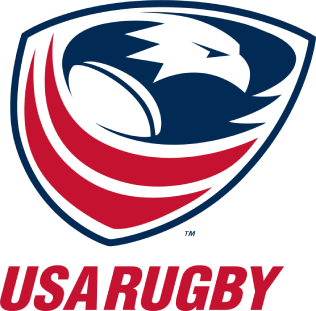
The 1999 Rugby World Cup was the fourth Rugby World Cup, the quadrennial international rugby union championship, the first World Cup to be held in the sport's professional era.

The Namibia national rugby union team represents Namibia in men's international rugby union competitions nicknamed the Welwitschias, are a tier-two nation in the World Rugby tier system, and have participated in the six Rugby World Cup competitions since their first appearance in 1999. They are governed by the Namibia Rugby Union.

The 1987 Rugby World Cup was the first Rugby World Cup. It was co-hosted by New Zealand and Australia – New Zealand hosted 21 matches while Australia hosted 11 matches. The tournament was won by New Zealand, who were the strong favourites and won all their matches comfortably. New Zealand defeated France 29–9 in the final at Eden Park in Auckland. The New Zealand team was captained by David Kirk and included such rugby greats as Sean Fitzpatrick, John Kirwan, Grant Fox and Michael Jones. Wales finished third, and Australia fourth, after conceding crucial tries in the dying seconds of both their semi-final against France and the third-place play-off against Wales.

The Georgia national rugby union team, nicknamed The Lelos represents Georgia in men's international rugby union. The team is administered by the Georgian Rugby Union and takes part in the annual Rugby Europe Championship and the Rugby World Cup, which takes place every four years.

The Italy national rugby union team represents Italy in men's international rugby union. The team is known as gli Azzurri. Savoy blue is the common colour of the national teams representing Italy, as it is the traditional colour of the royal House of Savoy which reigned over the Kingdom of Italy from 1860 to 1946.

The United States men's national rugby union team represents the United States in men's international rugby union. Nicknamed the Eagles, it is controlled by USA Rugby, the national governing body for the sport of rugby union in the United States. USA Rugby is a member of Rugby Americas North, one of six regional governing bodies under World Rugby. Until rugby returned to Olympic competition, with sevens at the 2016 Rio Games, the United States was the reigning Olympic rugby champion, having defeated the one other competitor in 1920 and the two other competitors at the 1924 Summer Olympics.
The Tahiti national rugby union team is a third tier rugby union team, representing the island of Tahiti in French Polynesia, an overseas collectivity of France. They first played in 1971 and have played numerous games to date, most against rivals Cook Islands and several against Niue. Other games have been played against Samoa, Wallis and Futuna, Papua New Guinea and Tonga. France played a match against Tahiti at the end of their 1979 tour and won 92–12. Plans to have annual "test" match series against Pacific island neighbours, New Caledonia have been put on hold, due to time, availability, finances, and coaching and refereeing resources. They have yet to qualify for the Rugby World Cup. Rugby union in Tahiti is administered by the Fédération Tahitienne de Rugby de Polynésie Française. Currently, players who have represented or played for the Tahiti national rugby team, are eligible to represent France. However, playing at a professional level can only enable this. At present there are several Tahitian professional rugby players abroad in France's Top 14 and Pro D2 professional competition.
The 1995 Rugby World Cup was preceded by a qualifying campaign in which forty-five nations were entered. 16 teams participated in the finals tournament in South Africa, seven of which came through qualifying matches. Eight were granted automatic entry as they were quarter-finalists at the 1991 Rugby World Cup, and South Africa qualified automatically as hosts.

The Arabian Gulf rugby union team was a combined team of players that represented the countries of the Gulf Cooperation Council in international rugby union competitions. The team competed in international matches between 1993 and 2010, and was governed by the Arabian Gulf Rugby Football Union (AGRFU). Associate members were Egypt, Lebanon and Jordan.

2011 Rugby World Cup qualifying began at the 2007 tournament in France, where twelve teams earned a place in the finals of the tournament, this automatically qualified them for the 2011 Rugby World Cup in New Zealand.
The 2008–10 European Nations Cup First Division was the 7th edition of the championship since it was reformed in 2000. The championship not only determined the champions of the ENC but it also acted as an element of European qualification for the 2011 Rugby World Cup in New Zealand.

The Oceania Rugby Men's Championship is an international rugby union competition for countries and territories from Oceania with national teams in the developmental band. It is administered by Oceania Rugby.

The United States national rugby union team has played in all but one Rugby World Cup since the inaugural tournament in 1987. The USA is the second strongest national rugby side in North America, and the third strongest in the Americas after Argentina and Canada.
For the 1995 Rugby World Cup qualifiers, the European Federation was allocated three places in the final tournament. This was in addition to the four places granted to England, France, Ireland and Scotland based on their results from 1991.
For the 1995 Rugby World Cup in South Africa, the Oceania teams from Australia, New Zealand and Western Samoa were granted automatic entry due to reaching the quarter-final stages of the 1991 tournament.
For the 1995 Rugby World Cup in South Africa, the Confederation of African Rugby was allocated one direct qualifying place in addition to the automatic qualifying place granted to South Africa as host of tournament.
The Confederation of African Rugby was allotted one place in the 1999 Rugby World Cup by direct qualification and one place in the repechage tournament. This was in addition to the automatic qualifying place granted to South Africa as champions of the 1995 tournament.
The Asian Rugby Football Union was allotted one place in the 1999 Rugby World Cup by direct qualification and one place in the repechage tournament. Eight teams participated in the qualification tournament for Asia which was held in three stages. The first two stages were played in 1997 and the last stage was played in 1998.
Qualifying for the 2019 Rugby World Cup for European Rugby began in September 2016, where 5 teams are competing for one direct qualification spot into the final tournament, and a further 26 teams competing, alongside the initial 5 teams, for a place in the Europe/Oceania play-off and or repechage.









